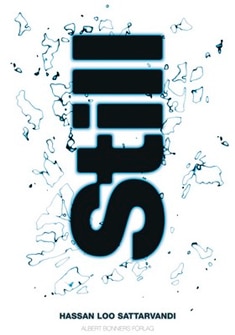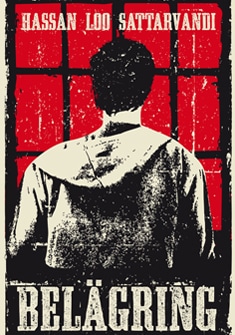
Still Still
Nemo, Ivan, Foggy and Saladin drift among the blue high-rises in the Stockholm suburb of Hagalund, also known as Blue Hill. Their days are spent trying to score weed, coke, roofies, uppers, downers – anything to distract them from their meaningless lives. Arbitrary violence is another method to kill time. When they steal a car to get the hell out of Blue Hill they can’t think of anywhere else to go, and end up crashing it straight through the wall of the local school. Mostly though, time just stands still. As the sweltering summer days pass, their world keeps closing in on them, while they continue to drift around the yards, viaducts, and tunnels of a Stockholm suburb that wraps around mind and body like a dank, stagnant prison. Still is a novel about our time – violent, gritty and desperate.
Still was awarded the 2009 Catapult Prize for ‘Best First Novel’. The Catapult Prize jury said of the book: “Ruthless, heavy subject matter, cut with skill and fervor in a pitch-black yet evocative flow that makes the Stockholm suburb of Hagalund resemble a terrace of purgatory as well as a place under the stars.”
Awards
| The Catapult Prize (Best First Novel) Sweden | 2009 |
| Shortlisted for Borås Tidning’s First Book Award Sweden | 2009 |
Reviews
-
“A veritable roar from the abyss… The novel begins with a quote from Hubert Selby Jr., whose spirit hovers over the pages and whose cult novel Last Exit To Brooklyn flits past at one point in the book. Still is imbued with the same staunch loyalty with people at the very bottom of society as in Selby Jr.’s work, the same naked depictions of violence, drugs and alienation, the same attentively emulated slang-heavy dialogue.”
-
“A furiously raw, gritty and poetic novel about a summer among the tenement blocks of a Stockholm suburb… Here, the longing for something else is not so much a dream as it is an internal ripple of panic, assuaged by Rohypnol. The story moves, just like the protagonist’s wretched condition, in a painful circle. Sattarvandi writes in a furious flow without punctuation, like a William Faulkner from the Swedish suburbs, stylistically driven and scorchingly evocative.”
-
“A rough and uncompromising study of the collective anxiety that arises in an unequal society… With his incomparably precise use of language, Sattarvandi manages to hold the reader's attention until the very last page, all because of a nervy and rhythmic prose that is reminiscent of the repeatedly referred to The Waste Land [by T.S. Eliot] as well as of Kerouac's The Subterraneans, if one must necessarily compare it to other literature. [Still is] one of the year's first books and it will also be one the year's most important. Read it.”
-
“Hassan Loo Sattarvandi's Still is a dark, somnambulant novel, constantly slipping between sleep and waking, now and then, torpor and dream… The long, flowing passages are both unbearable and irresistible. Reading Still feels like ice swimming. Dark, ice cold water. One just wants to get out, one just wants to stay, wide awake.”
-
“Hassan Loo Sattarvandi…has written a raging and taut novel in a very effective language of slang and interjections. The fact that the prose remains musical and accessible without punctuation and with a dialogue injected without quotation marks may be proof that the language is attentively overheard and accurately captured. A kind of contemporary iceberg prose, where the desperation throbs out of the numerous descriptions of substance abuse. It is possibly the most affecting depiction of young addicts that I have read.”
-
“In long sweeping sentences, where the dialogue is intermingled and the time line is dissolved, [Sattarvandi] illustrates the exterior state of being. But between the depictions of fist fights and the rolling of joints, a poignant despair shines through, and the fluid narration reinforces the impression of a life that is no more than a long, painful intoxication. It is reminiscent of other depictions of suburbs, such as the brutal films La Haine and Nil By Mouth… Still is a piercing debut. It pulsates, under a surface of drugs and violence, of a powerless longing for something else. But in the novel’s world everything stands still. And that sets the reader’s thoughts in motion.”
-
“Not only memory is looped in Hassan Loo Sattarvandi's first novel Still. Even the present is in a ghastly repetition, where the same procedures are performed in an endless circle: drifting about, abusing drugs, and using violence against every person – friend or foe – who shows the slightest sign of weakness… I am very impressed by Sattarvandi's accuracy and skill in depicting a state where time and words have driveled away and things no longer have any meaning.”
-
“Hassan Loo Sattarvandi displays rare literary abilities.”
- Author
-
 Hassan Loo Sattarvandi
Hassan Loo Sattarvandi
- Published
- 2008
- Genre
-
- Literary
- Pages
- 228
- Reading material
Swedish edition
- Rights sold
-
Sweden, Albert Bonniers
